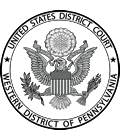1:22-cv-289 Butler v. Little et al (5/23/25) Pro Bono Counsel Obtained
The Plaintiff, an inmate incarcerated with the Pennsylvania Department of Corrections, has a claim for punitive damages against a DOC employee at SCI-Forest which is now ready for trial. The Defendant is alleged to have unconstitutionally rejected mail addressed to the Plaintiff from the Pennsylvania Superior Court without notifying the Plaintiff of that action. See ECF No. 59. Precedent of the United States Court of Appeals for the Third Circuit specifies that due process requires prison officials to give notice of a rejection of inmate mail and an opportunity for the inmate to object to such an action. Id. p. 6. The law permits a jury to award punitive damages where the evidence supports a finding that a defendant knowingly violated a plaintiff’s constitutional rights. Id. p. 7. Attempts to settle this matter prior to trial have not been successful and the Court has scheduled this matter for trial in October of 2025. See ECF No. 64.
If interested in working on this case, please send an e-mail to PAWD_Pro_Bono@pawd.uscourts.gov
Documents:
Butler Docket Sheet
Butler Amended Complaint
Butler Answer to Amended Complaint
Butler Order Appointing Counsel
